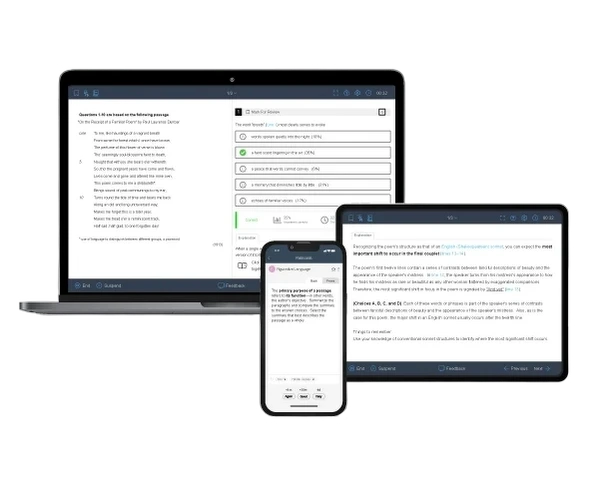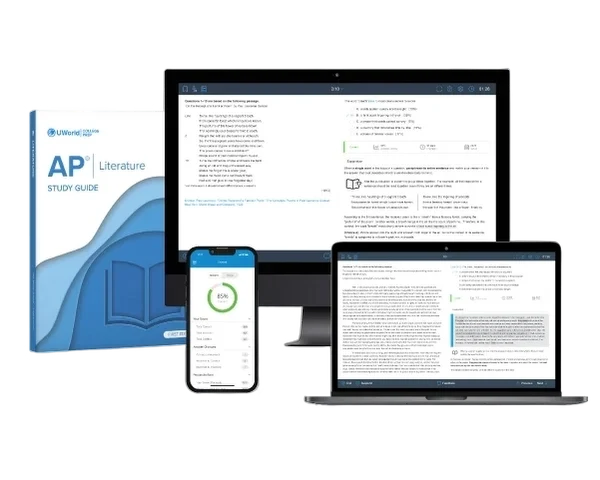Strong essay writing skills are crucial for success on the AP® Literature exam. A well-crafted essay demonstrates your ability to analyze texts deeply and construct coherent arguments.
The free-response section of the AP Lit exam includes 3 essays and challenges you to interpret literature, develop a clear thesis, and use textual evidence effectively — all under a 2-hour time pressure. Good writing skills can boost your exam score and prepare you for college-level analysis and critical thinking. By mastering essay structure, literary techniques, and argumentation, you'll be able to approach any prompt with confidence.
This guide will help you break down prompts, craft insightful responses, and refine your writing.
5 Tips for Writing a Good AP Lit Essay
Effective preparation and smart strategies can make all the difference on exam day. Here are some key AP Lit essay tips to help you craft a strong essay:
- Allocate time wisely during the exam to outline your thoughts, write clearly, and revise your work.
- Revise your essay if time permits, ensuring smooth transitions and a focused argument.
- Read the prompt several times to ensure you fully grasp what is being asked.
- Highlight key phrases and literary devices in the passage to guide your analysis.
- Deepen your understanding of literary elements and their impact on the text.
- Plan your essay structure with a clear, debatable thesis that outlines your argument and organizes your evidence.
- Use direct quotes sparingly. Support your analysis with specific textual evidence instead.
- Focus on analysis rather than simply summarizing the plot.
- Enhance readability and engagement with clear organization and concise language.
- Avoid using first-person and casual language to maintain a formal tone.
- Write essays on different prompts regularly to build your analytical skills.
- Have teachers or peers review and critique your essays for valuable feedback.
3 AP Lit Essay Types: How To Write Each Effectively
In the free-response section, there are 3 AP Lit essay types that you'll encounter:
Poetry Analysis (Question 1)
You will read a poetry passage and develop a thesis that interprets its imagery, symbolism, and overall structure, supporting your insights with clear textual evidence.
How to Write a Good Q1 Essay for AP Lit
- Identify literary devices like metaphors, similes, and personification, and explain how they contribute to the poem's meaning.
- Pay attention to word choice and tone — how do they shape the reader's emotions and understanding?
- Structure your essay with a clear thesis, organized body paragraphs, and strong textual evidence to support your interpretation.
Sample Prompt: In John Rollin Ridge's poem “To a Star Seen at Twilight,” published in 1868, the speaker admires a solitary star shining at twilight and considers its significance. Read the poem carefully. Then, in a well-written essay, analyze how Ridge uses literary elements and techniques to convey the speaker's complex reflection on the star.
Prose Fiction Analysis (Question 2)
You will analyze a passage of prose fiction or drama by examining narrative style, character development, and thematic elements to craft a well-organized response.
How to Write a Good Q2 Essay for AP Lit
- Read the passage carefully and look for narrative techniques, such as point of view, tone, and dialogue.
- Develop a strong thesis that directly answers the prompt and explains the passage's deeper meaning.
- Use specific quotes from the passage and analyze them — don't just summarize the plot.
- Organize your essay logically, ensuring each paragraph builds on your main argument.
Key Elements to Analyze in a Prose Essay
A prose essay focuses on how an author creates meaning in a fiction or drama passage. To analyze the passage, consider these questions:
- Who is telling the story, and how does that shape the meaning?
- How do the characters' thoughts, actions, and dialogue reveal important themes?
- Are there recurring images or symbols that add depth to the story?
Sample Prompt: The following excerpt is from Mavis Gallant's short story “One Morning in June,” published in 1952. In this passage, Mike Cahill is in France for one year to explore his talent for art. Read the passage carefully. Then, in a well-written essay, analyze how Gallant uses literary elements and techniques to convey Mike's complex experience of studying painting.
Literary Argument (Question 3)
You will be given a literary concept or idea and must select an appropriate work of fiction to build an evidence-based argument, showcasing your ability to construct a compelling thesis.
How to Write a Good Q3 Essay for AP Lit
- Choose a literary work that strongly aligns with the prompt and provides ample textual evidence.
- Develop a clear and focused thesis — avoid making general or vague claims.
- Explain how literary elements like theme, character development, and symbolism support your argument.
Sample Prompt: Many works of literature feature a character who may be reluctant to make a decision, unable to make a decision, or is resistant to doing so. This indecision can have broader implications for that character or other characters. Such implications may include changes to a character's relationships, social and/or financial stability, well-being, or any other aspects of the character's existence. Either from your own reading or from the list below, choose a work of fiction in which a character delays or avoids making a decision. Then, in a well-written essay, analyze how the impact of this indecision contributes to an interpretation of the work as a whole. Do not merely summarize the plot.

How AP Lit Essays Are Scored
Before you start writing your AP Lit essay, take a moment to plan your approach. A clear outline helps keep your ideas organized and your argument strong.
Understanding the Prompt and Passage: Answer the Question Completely
AP readers want to see that you fully understand the prompt and engage with the passage at a deep level. Read the prompt carefully before you start writing your essay. That will give you a clear understanding of what the question is asking.
- Break down the prompt: Underline key tasks and identify the literary elements you're asked to analyze.
- Go beyond surface-level meaning: Look for deeper themes like morality, human nature, or relationships.
- Analyze literary devices effectively: In poetry and prose analysis, explain how imagery, diction, or structure shape meaning. In a literary argument, choose a work that strongly supports your thesis.
- Avoid summary: Focus on interpretation and insight rather than retelling the plot.
Building a Strong Essay Structure: Present a Clear, Cohesive Argument
Graders reward essays that are well-structured and easy to follow. Divide the essay into 3 parts: introduction, body, and conclusion.
- Introduction: Start with the title and author, then state a clear, defensible thesis that answers the prompt directly.
- Body paragraphs: Each paragraph should focus on a single idea that supports your thesis, backed by specific textual evidence. Analyze how and why the text's literary elements contribute to meaning. Use transitions to maintain logical flow.
- Conclusion: Reinforce your argument without repeating points verbatim. End with a fresh take that ties back to the prompt.
Analyzing AP Lit Example Essays
Reviewing high-scoring AP lit example essays is a powerful way to understand what graders look for in your responses. By studying these examples, you can see firsthand how a well-structured essay presents a clear thesis, supports arguments with strong textual evidence, and maintains a logical flow. This process shows you the effective strategies used in successful essays and helps you recognize areas where you can improve your writing.
- Study College Board-released essays and scoring guidelines.
- Practice writing responses to past prompts.
- Compare their essays to high-scoring samples to identify areas for improvement.
- Analyze differences in thesis clarity, textual evidence, and overall flow to refine your approach for a stronger final essay.
Writing AP Lit Essays with Confidence
Writing a strong AP Lit essay requires more than just understanding the text — it's about crafting a clear argument, using precise textual evidence, and demonstrating insightful analysis. By practicing regularly, studying high-scoring examples, and refining your essay structure, you can develop the skills that AP graders look for.
If you stay confident, manage your time wisely, and trust in our AP English Literature course, question bank, and study guide, you'll be ready to tackle the AP Lit exam and earn a top score!

Frequently Asked Questions (FAQs)
How do I choose a topic for my AP English Literature essay?
Choosing a topic depends on the prompt and your familiarity with literary works. Focus on a text where you can effectively analyze themes, character development, and literary devices.
How important is it to incorporate literary devices in my analysis?
Incorporating literary devices is crucial, as they help illustrate the author’s techniques and enhance your argument. Analyzing devices such as symbolism, imagery, and irony enhances your essay.
How can I improve my analytical skills for AP Literature essays?
Practice close reading, annotate texts, and write analytical responses regularly. Engage in discussions, explore different interpretations, and read literary criticism to deepen your understanding and strengthen your arguments.
Is it advisable to use the first person in AP Literature essays?
No. AP Literature essays should maintain a formal academic tone. Avoid using “I” or “my” and instead focus on objective analysis. Writing in the third person creates a more sophisticated voice, which is essential for effectively presenting your thoughts.
What common themes appear in AP Lit essay questions?
Common themes in literature include identity, conflict, power, fate, and human nature. These themes often explore complex emotions, moral dilemmas, and societal influences.
How many words should an AP Lit essay be?
AP Lit essays are usually 400-700 words, depending on depth and detail. Focus on clear analysis and strong textual evidence rather than word count.
How many essays are on the AP Lit exam?
The AP Lit exam includes 3 essays: poetry analysis, prose analysis, and a literary argument. Each requires close reading, critical analysis, and evidence-based arguments.






